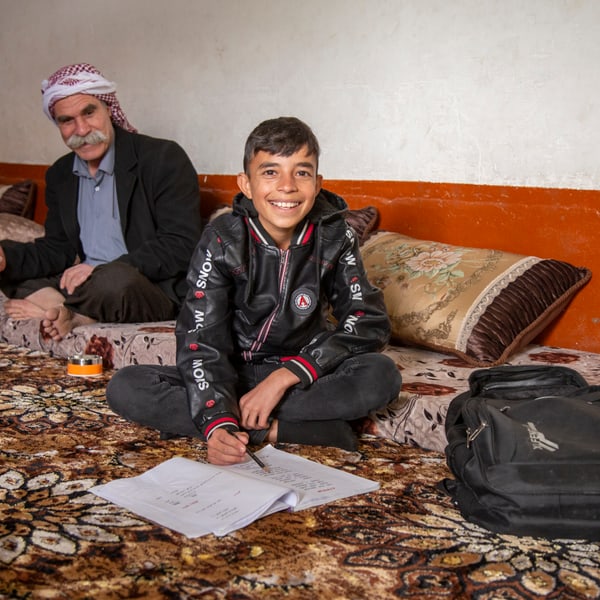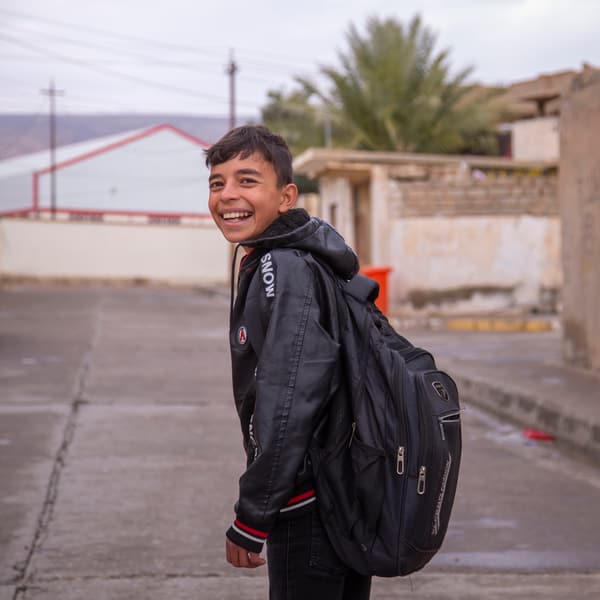"I want to become a doctor and I'm going to set up a clinic in my village because I want to treat the people who need it."
In the districts of Sinjar and Al-Baaj, located in the governorate of Nineveh, this sentence is repeated dozens of times by the children during our report. Close to the Syrian border, in an area devastated by the Islamic State (IS), the time has come to rebuild after the war.
The interviews are conducted in the privacy of the family homes, seated on traditional sofas decorated with patterns. A gas heater in the living room helps to beat the harshness of winter. In the homes, there is a sense of relief that the children are finally benefiting from a decent education after the chaos, as Mahmoud, the father of Zeid, 12, explains. "We were displaced for four years, during which time Zeid missed school. Four years can destroy a child's life." His son is delighted to be able to go back to school because school gives him a sense of purpose. "It's my second home, I love going because I know it's going to help me have a bright future and a good life."
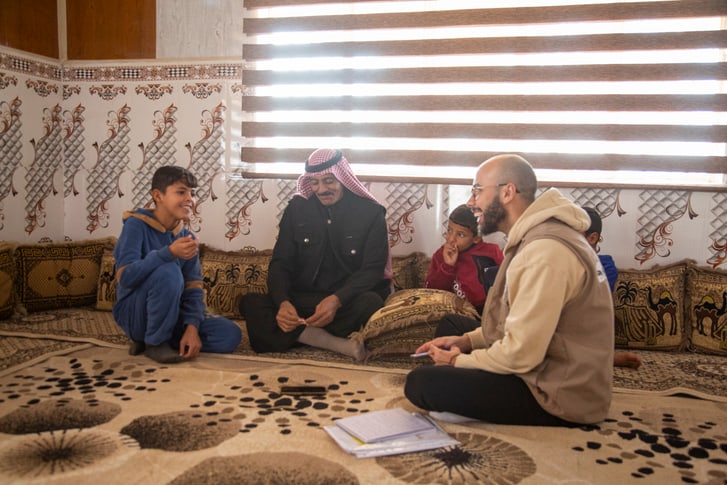

"Education is the most important thing in life. At home we don't have a table, so to study and write, I put a pillow on my legs. When there are power cuts, I use a small battery-operated lamp."
The project
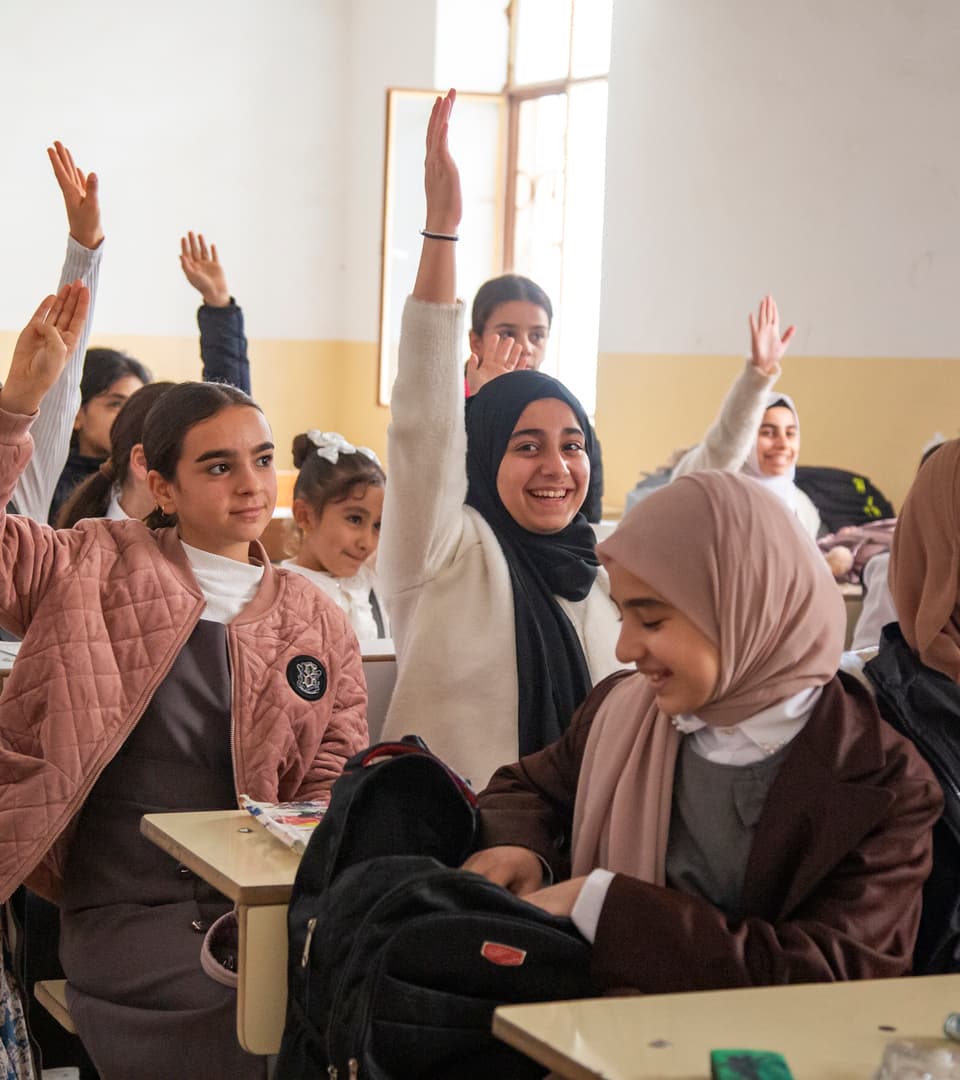
As part of the "Education Cannot Wait" project, which Terre des hommes has been running for two years in consortium with other organisations, many schools are receiving material and human support.
For example, Tdh installs sanitary facilities, play areas and sports fields to create ideal conditions for studying.
At the same time, pupils who need it receive school supplies and help to buy clothes or a schoolbag.
To strengthen education, teachers are coming to the school to give support classes, as many children have fallen behind due to forced displacement caused by the war.
In total, Tdh has supported more than 2,500 children and adolescents in two years.

As part of the "Education Cannot Wait" project, which Terre des hommes has been running for two years in consortium with other organisations, many schools are receiving material and human support.
For example, Tdh installs sanitary facilities, play areas and sports fields to create ideal conditions for studying.
At the same time, pupils who need it receive school supplies and help to buy clothes or a schoolbag.
To strengthen education, teachers are coming to the school to give support classes, as many children have fallen behind due to forced displacement caused by the war.
In total, Tdh has supported more than 2,500 children and adolescents in two years.
Zidan, aged 13, is still at primary school and has benefited from Tdh's remedial classes. This is one of the pillars of "Education Cannot Wait": ensuring that all children can catch up. "These classes have two aims", sums up Nisith Shrivastawa, child protection coordinator. "To help children go back to school to follow a traditional curriculum or, for those who are unable to catch up, to teach them vocational skills so that they have a future and know how to cope with their lives".
In the intimacy of the homes, the stories told are punctuated by poignant silences. We listen. One story follows another. Often heartbreaking. Like that of Khouny, mother of eleven children and widow since 3 August 2014, when her husband was shot dead by the IS. She tells the story of her eldest son, who chose suicide when he realised that he would not be able to finish his studies for lack of funds, even though he was counting on a degree to provide for his family. Wearing a traditional abaya and a headscarf covering her hair, she smiles with dignity. She explains how she got back on her feet, now mobilising her community in the name of Tdh. For one thing, she doesn't want other families to have to endure the same tragedy because of the limited prospects. She is so grateful that her children are now at school.

"I chose to get involved to work with people who help and support my children. To help all those in need, like us. I'm respected and listened to here, so I can take action, especially as I've learnt a lot from the Terre des hommes training sessions about the importance of positive education or child protection. I'm now ready to lead awareness-raising sessions."
These sessions aim to prevent dangers as well as teaching good hygiene practices. Fahima, another mother, is delighted to be taking part in the meetings. "You know, I didn't go to school so I come to you to learn and then pass it on to my children." In this way, the children are taught about the dangers they run when they venture onto an abandoned lot or house that could be trapped by remnants of explosives or munitions that have not been activated.
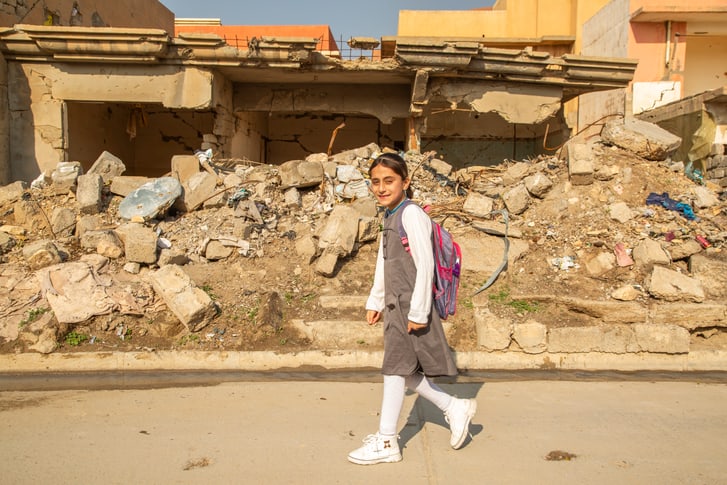
Working hand in hand with public authorities whose resources are limited, organisations such as Terre des hommes seek to make their actions sustainable over the long term. So that parents let their children continue their studies, whatever the cost, so that they quickly become role models for their younger siblings. So that all these young dreamers, Zeid, Rana, Zidan and the others, can pursue to the end their goal of putting on a white doctor's coat to help others, to give Iraq back its momentum. For as Panda Premananda, head of the Tdh delegation in Iraq, puts it,
"the future lies with the children".
Did you know?
80 %
of children in Iraq start primary school without having been to kindergarten
140
Iraq's world ranking in terms of primary school enrolment rates
60 %
Yes, I want to make a difference.





